'Seek medical help if after five days of the first symptom the fever has not subsided.'

In a piece of startling news, Covid has once again surfaced and surged, this time in the northern states of Delhi, Rajasthan, UP and Bihar.
Who can forget the nightmarish days in 2020 when Covid took a hold of the world, leading to 5.3 lakh deaths in India alone as of March 10, 2024?
So, what does the new wave portend?
Dr Mathew Varghese, Head of Orthopedics, St Stephen's Hospital, Delhi, who is acclaimed for his insights in managing Covid during the worst times of the pandemic, tells Shobha John that this variant has a high propensity to spread, but is milder in nature.
There are new cases, but those becoming serious are the elderly and only less than 1% of the cases.
"Masks protect from the spread of infection. With the current levels of infection, there does not seem to be any need for everyone to rush and wear masks", Dr Mathew Varghese tells Rediff.com Contributor Shobha John.
What is the reason for the Covid surge in north India when in the past states such as Kerala and Maharashtra have had the highest number of cases?
This is a congenial time for the spread of such viruses, be it Covid or influenza.
The variant, supposedly JN.1 which is what is being seen in the US, has a high propensity to spread fast and is a relative of BA.2.86 (Pirola virus) of the lineage of the Omicron virus.
Viral infections like influenza, H1N1 and Covid-19 usually surge during transition weather -- spring, fall time...when the weather changes from cold to hot or hot to cold.
This variant, which was first reported in the US, spread so fast there that within a span of three weeks over 80% of cases were from this variant.
The head of WHO had declared an end to Covid-19 as a public health emergency last year. Yet Covid cases increase and decrease periodically. Is this natural and is Covid here to stay?
It is natural for this virus (or for that matter any virus) to mutate and surface from time to time as a new variant.
WHO has classified this variant of JN.1 as a variant of interest, but the disease is milder now.
The symptoms are like common cold -- running nose and sore throat -- and reports are that it can be accompanied by loss of smell and all features of an upper respiratory tract infection.
How can one distinguish between Covid and influenza?
That can be found out only through testing. Many hospitals have a specific protocol for this.
For example, if a patient comes down with symptoms of pneumonia, he or she is likely to be tested for H1N1 flu and also for Covid. That is how these cases have been identified.

You were the first doctor in India to come up with a timeline for Covid after analysing data from various patients. Should this timeline be followed again? Could you repeat it for readers?
I have not followed many patients as closely as in the peak of the last epidemic. Cases presently are too low to garner data from.
However, during the Delta wave, there was a specific pattern to the disease, but by and large, the incubation period is estimated to be 3-5 days, with running nose and cold like symptoms which may last 4-5 days.
After this, patients, especially those with poor immunity, may have secondary bacterial infection. This will cause breathlessness and could become serious.
Is the use of the Oxymeter to check oxygen levels over-rated and should one depend solely on it?
No, not at all. There is no need for Oxymeters. Breathlessness is a far better indicator of the lack of oxygen; breathlessness preceded by fever and cough.
Seek medical help if after five days of the first symptom the fever has not subsided.
An Oxymeter is useful only in a hospital setting, not at the community level. There is no need to panic and buy Oxymeters.

Should precautions be taken once again such as wearing masks and carrying sanitisers, or should one wait till the government issues an advisory?
Masks protect from the spread of infection. With the current levels of infection, there does not seem to be any need for everyone to rush and wear masks.
However, it may be wiser to do strategic mask wearing. For example, wear a mask when going to a hospital or if you have a cold or cough and you are in large gatherings.
When a senior citizen is at home, do not let him interact with visitors without giving him a mask, especially if they have cough or cold.
I would not suggest general masking as it is unrealistic. A surgical mask is good enough for the community, but an N95 mask is recommended for a health worker.
A survey found that every human takes his hand to his face several ties in an hour, some times as much as 10 times. So hands always carry the viruses and spread them.
Therefore, hand washing and sanitisers are very useful in checking the spread of the virus.
We must also be on the look out for notices from the health ministry for any new guidelines.

You yourself have seen innumerable Covid patients in hospital and yet, you have remained safe. What were the precautions you took?
I always wore an N95 mask and used sanitisers before touching any patient. Also, I did hand washing from time to time.
I once held a child in my arms who later turned out to be Covid positive, but I was still protected because of the mask and sanitiser.
Perhaps these and the fact that I have also been vaccinated helped to keep me safe.
Some people have also taken Amla (Indian gooseberry) juice, which is rich in Vitamin C, everyday to boost immunity. Others have been taking ginger and turmeric concoctions. Do these home remedies help?
All these are good sources of minerals and vitamins and help in boosting immunity. Turmeric is an anti inflammatory. But how they protect and in what dose should you have them are all empirical questions.
Eventually, it is your body immunity that fights the virus. No antibiotics or drugs work against viruses.
The human body is designed to get minerals and vitamins from various food items, be it fruits, nuts, vegetables.
We need to have a balanced diet to keep healthy. One can't be on a monochromatic diet and hope to boost immunity.
A recent study found that the Covishield vaccine elicited immune responses of higher magnitude than Covaxin. What are your views regarding these two vaccines?
Both are different platforms of vaccines and their immunity protection is different.
While Covishield uses the spike protein of the virus and uses a carrier virus, Covaxin is an inactivated virus vaccine.
While over 90% of vaccines given in India are Covishield, with the rest being Covaxin, both have been reported to be effective in preventing serious illness.
In the final analysis, it is the body's immunity that helps fight the virus.

There have been reports about Covid vaccine side-effects such as blood clotting and heart issues. Should people be vigilant before taking vaccines?
We don't have clear evidence whether these adverse effects are due to Covid vaccines alone or a subclinical infection and the vaccine or some other factors added on. Investigation is going on.
For the first time in history, these vaccines were produced on a fast-forward mode and emergency authorisation was given due to the health crisis facing the world.
Ordinarily, most vaccines take 5-10 years to develop and many have had adverse reactions and early stage disasters, including in the development of the polio vaccine.
So, it is wise that everyone be cautious. Recommendations are issued from time to time.
To the best of my knowledge and understanding, there is no need to rush for a booster shot.
During a fresh wave of infections, vaccines do not help as it takes time for the immunity to develop and protect you. Until then, you are vulnerable, while you may think you are safe and protected by the vaccine.

Should one take vaccines such as for influenza or just let the body develop immunity?
The average citizen needn't take it, but vulnerable people such as the elderly people and those with poor immunity are recommended to take regular preventive vaccines for influenza.
However, there is no such recommendation for Covid-19. We have to wait for further research and evaluation.
But there is no one size fits all vaccine. Even as we develop new vaccines, newer variants keep cropping up.
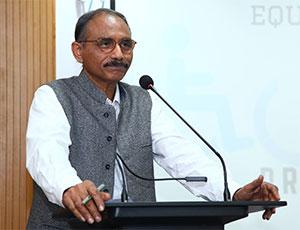 IMAGE: Dr Mathew Varghese. Photograph: Kind courtesy Dr Mathew Varghese/Facebook.com
IMAGE: Dr Mathew Varghese. Photograph: Kind courtesy Dr Mathew Varghese/Facebook.comSome of those affected by Covid have had a lasting effect called Long Covid, which includes brain fog. Is this likely to go away anytime?
Development of new symptoms three months after the initial SARS-CoV-2 infection and these lasting for at least two months with no other explanation is called Long Covid.
A study found that some 10% of those affected with Covid had Long Covid. This includes loss of memory, cognitive decline and difficulties that are colloquially referred to as "brain fog". It also includes muscle weakness, tiredness/malaise.
Many who had severe disease and were in ICUs are more severely affected. However, we are still struggling to understand the reasons and therapies for Long Covid. WHO has set up a committee for long term evaluation of Long Covid.
Many who had steroids have side effects from their use, including damage to the hip joint from loss of blood supply to the ball of the joint. This is separate from Long Covid.
Feature Presentation: Ashish Narsale/Rediff.com
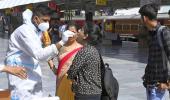
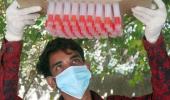
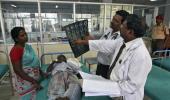
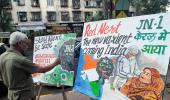




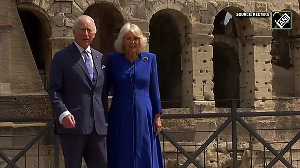


 © 2025
© 2025